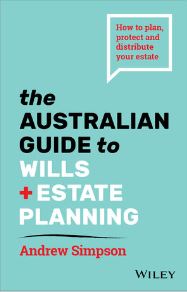Back in the 1800s Dwight L Moody, an evangelist and publisher, said “Preparation for old age should begin no later than one’s teens. A life which is empty of purpose until 65 will not suddenly become filled on retirement”. Nothing has changed. Making sure that as you grow your wealth, assets are created in legal structures that will suit you both during your lifetime but also after death.
Andrew Simpson, author of The Australian Guide to Wills + Estate Planning, at the time of writing in 2019, was a Principal Lawyer with Maurice Blackburn Lawyers and was head of its Wills and Estate Groups.

This book explains in easy to understand language the essentials of what you should know to ensure your assets can be easily transferred to the people you wish to benefit upon your death.
Apart from assets held in Superannuation, real estate is likely to be the most common asset for holding wealth. When you are buying Real Estate, the first person of contact is likely to be your real estate agent. This person will have no idea of your personal financial situation, so it is important that before you sign a contract, you seek professional advice from your financial advisor, accountant or lawyer as to what is the most suitable entity for ownership.
The first problem may be where you are purchasing a property as a co-owner. There are two important ways to purchase this type of property:
- Joint Tenancy is where the property ownership reverts to the other joint tenants on your death. If there are only two people, then the property will revert to the second person, regardless of what you intended in your will. If there are say three people, the last surviving person receives ownership of the property.
- Tenants in Common is where each person owns their share of the property. If one of the co-owners dies, then their share of the property will be distributed to the person or entity listed in the will, according to their percentage of ownership.
I would never advocate trying to be your only source of information when it comes to wealth creation.
However, I do advocate that you have a general working knowledge in relation to taxation and estate planning. Many choices are made early in life, and it is important for you to understand such matters as income tax and capital gains tax while seeking professional advice from your accountant.
It is equally important to understand the implications of choosing the right legal entity in which to own your assets. Advice should be sought from your financial adviser or lawyer before you embark on any new asset acquisition.
This book, The Australian Guide to Wills + Estate Planning will provide you with most of the general knowledge you require as background information. It will point out the consequences of making the wrong choices. At the end of the day, we all want to make sure that when we die, our legacy will go to the people it was intended for.
I would recommend this book to any person who has assets to manage, and more importantly for people who are planning to purchase new assets.
Glenis Phillips SF Fin – Designer of Financial Mappers and Advice Online
Disclaimer: Financial Mappers does not have an Australian Services License, does not offer financial planning advice, and does not recommend financial products.







